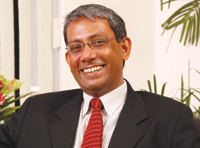 Dilip Thakore interviewed Ravi Venkatesan, the Bangalore-based chief executive of Microsoft India (who was abroad) through e-mail. Excerpts:
Dilip Thakore interviewed Ravi Venkatesan, the Bangalore-based chief executive of Microsoft India (who was abroad) through e-mail. Excerpts:
It’s well-known that education and healthcare are high priority objectives of your parent Microsoft Corporation Inc, USA. How important are these socio-economic issues for Microsoft Corporation (India)?
Microsoft Corporation began with the dream of a PC on every desk and in every home. Thirty years ago, this seemed impossible. Today, for the one billion people information technology has touched, life has changed profoundly: information is more readily available, connections are more easily made, commerce is more quickly achieved, and success is closer than ever. But for more than five billion people, the opportunity to learn, connect, create, and succeed remains elusive.
The effort to reach the benefits of technology to underserved people and communities worldwide is the rationale behind Microsoft’s global Unlimited Potential initiative. Under this program, we are committed to helping all people benefit from information and communications technology (ICT) that is accessible, affordable, and relevant to their needs. Through collaboration with governments, business partners, NGOs, partners, educators, and academics, we especially want to reach young people, as they represent the future.
In line with this objective, one of the key areas we are focusing on in India is education and skills building.
What’s the connection, if any, between the Bill and Melinda Gates Foundation and Microsoft?
Microsoft Corporation and the Bill and Melinda Gates Foundation are two separate entities.
In a low-profile style, Microsoft India has been involved with indian education. How deep is your engagement with education in India?
Microsoft’s vision for education in India is driven by the shared belief that the use of technology in education will help remove limitations, build requisite skills, foster innovation, and enable students and teachers to achieve their full potential. There are many initiatives we run in the country to enable educators and students, to equip underserved communities with requisite skills, and sustain India’s position in the global knowledge economy.
We try to serve the ecosystem through the breadth of our efforts, as well as depth. Programs such as Partners in Learning and Project Shiksha are designed to build capacity and share best practices through technology and improve its use in learning. 512,000 school teachers trained is not a small number, but there is much more to do. The program also aims to help schools gain better access to technology, foster innovative approaches to pedagogy development and provide education leaders with the tools to envision, implement and manage change.
What in your opinion are the major challenges confronting K-12 and higher education in India?
There are 1.3 million schools in India with over 220 million children. Such a massive education system, though admirable in its reach and magnitude, faces problems of infrastructure, sufficiency of quality teachers, relev-ant curriculum and administration. The issue of equipping teachers with the wherewithal to impart quality education is a concern. The answer is not to wait until we have enough teachers, but to increase the impact of the teachers that we already have. Technology has the power to revamp teaching and learning methods and extend the walls of classrooms around the world.
In particular, how satisfied are you with the quality of engineering and science graduates of Indian colleges and universities whom you recruit into Microsoft India?
I believe that the biggest asset we have in Microsoft is our people. As an employer, the company constantly strives to attract the best talent, and we have never been disappointed with the potential of the people we hire in India. We believe in developing and retaining talent by offering enriching jobs, creating opportunities to build great careers and providing an enabling work environment, all of which helps our employees realise their potential.